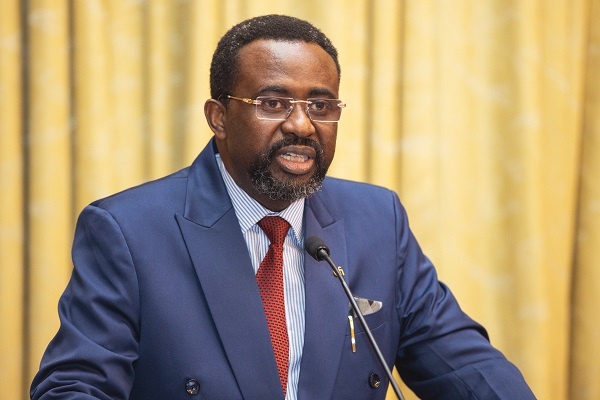BoG unveils sweeping regulatory measures
By Joshua Worlasi AMLANU & Ebenezer Chike Adjei NJOKU
The Bank of Ghana has unveiled a series of sweeping regulatory measures aimed at restoring local decision-making authority in foreign-owned banks, addressing rising concerns over asset quality, and tightening consumer protection in the digital financial services space.
Speaking at a post-Monetary Policy Committee (MPC) meeting with bank chief executives in Accra on Tuesday, Governor Dr. Johnson Pandit Asiama said the central bank will soon issue a directive to ensure that boards and management teams based in Ghana retain “genuine authority” over all material credit and risk decisions.
This move is a direct response to the growing trend of key lending and risk assessments being outsourced to offshore principals beyond the scope of Ghana’s supervisory authority.
“Ghana-based boards must not serve as rubber-stamps for instructions issued from offshore,” Dr. Asiama said. “This undermines the very basis of effective governance and creates unacceptable regulatory blindspots.”
Under the forthcoming directive, any delegation of decision-making authority to foreign entities will require prior approval from the central bank. Banks that fail to ensure proper local deliberation before ratifying key decisions may be deemed in breach of Ghana’s Corporate Governance Directive and could face regulatory sanctions. Institutions by-passing local governance could also be subjected to fitness and propriety reviews of their directors.
The move, while firm, is not framed as a protectionist measure. “This directive is not anti-foreign. It is pro-accountability,” Dr. Asiama noted, adding that the integrity of Ghana’s financial system depends on institutions that are locally accountable and governed in the public interest.
Addressing High NPLs
Amid a broader effort to tighten regulatory oversight, the central bank is addressing other lingering vulnerabilities in the banking sector, particularly in relation to non-performing loans (NPLs). Dr. Asiama disclosed that a comprehensive directive will soon be issued to address Ghana’s persistently high NPL ratios.
Banks will be required to write-off fully provisioned loans with no realistic prospects of recovery, excluding related-party exposures. The new regime will impose a hard cap on NPLs, limiting them to 10 percent of gross loans by December 2026. Additional measures include stricter restructuring rules, mandatory collateral recovery and monthly disclosures of NPL data – including the public identification of willful defaulters in audited financial statements.
“These actions are part of our broader agenda to restore asset quality, promote sound lending practices and safeguard the resilience of Ghana’s financial system,” the Governor said.
Consumer protection Amid Opaque Fees
Consumer protection also featured prominently in the Governor’s address. The central bank plans to cap Optional Issuer Fees (OIFs) on cross-currency card transactions at 2 percent and will require mandatory disclosure of such fees to customers before transactions are completed.
The Bank of Ghana has raised concerns over opaque fee structures that undermine public trust in the banking and payments system.
Dr. Asiama also criticised the practice of applying interest charges to inactive credit accounts, which in some cases result in interest liabilities exceeding the original loan principal. Such practices, he said, “distort customer outcomes, misrepresent the true profitability of lending portfolios and violate the principles of fair treatment and transparency”.
Digital assets
A further regulatory intervention is expected by August 2025, when the Bank of Ghana will release its long-awaited digital lending guidelines. These will set out new standards for both bank-led and non-bank digital lending operations, including fintechs. The guidelines are expected to address licencing, disclosure, data privacy and ethical recovery practices.
The move is intended to stem a proliferation of predatory online lenders exploiting unregulated gaps in the digital finance ecosystem. The Governor cited increasing reports of harassment, coercion and deceptive practices targetting informal workers and young borrowers. “We cannot allow this to continue,” he said.
On the monetary policy front, the central bank opted to hold the policy rate steady at 28 percent… citing progress in the disinflation process. Headline inflation fell to 21.2 percent in April 2025, aided by a sharply appreciating cedi – up more than 24 percent year-to-date against the US dollar – and a record current account surplus.
“Our models now suggest that inflation could reach the medium-term target range as early as the first quarter of 2026, earlier than previously expected,” Dr. Asiama said. Maintaining the policy rate was framed as a necessary signal of policy continuity, designed to consolidate the credibility of macroeconomic reforms and contain inflation expectations.
CRR framework
The Governor also confirmed operationalisation of a revised Cash Reserve Ratio (CRR) framework, effective June 5, 2025.
Under the new rules, banks will be required to hold reserves in the same currency as customer deposits – cedis for domestic currency liabilities and foreign currency reserves for FX deposits. The measure is intended to better-align liquidity management with funding sources and enhance discipline in the foreign exchange market.
The central bank expects to expand its supervisory focus to include regulation of digital assets and cryptocurrencies. Dr. Asiama announced that a comprehensive framework for crypto regulation is being finalised in partnership with the Securities and Exchange Commission. Financial institutions were urged to begin strengthening their AML/CFT protocols, invest in cybersecurity and prepare for engagement with the Bank of Ghana’s regulatory sandbox.
“This is no longer a theoretical issue. The market is evolving. Regulation is coming. And our financial institutions must be ready,” he said.
Despite improvements in profitability and asset growth across the sector, the Governor stressed that legacy risks – such as weak credit governance and capital shortfalls – remain. He urged bank leaders to match the Bank of Ghana’s regulatory momentum with institutional discipline, fair pricing, transparent disclosure and ethical innovation.
“We are in a new phase of Ghana’s recovery, wherein confidence is returning and macro fundamentals are strengthening. But this phase also requires more discipline, greater fairness in conduct and deeper alignment between policy intent and market behaviour,” Dr. Asiama said.
The post BoG unveils sweeping regulatory measures appeared first on The Business & Financial Times.

